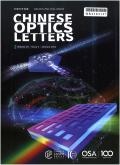金属-绝缘体-金属波导中可调谐超手性光斑的产生
IF 2.8
2区 物理与天体物理
Q2 OPTICS
引用次数: 0
摘要
光场的手性特征可以用g因子增强参数来评价,这有助于增强手性偶极子的手性信号。本文从理论上提出了金属-绝缘体-金属波导中的超手性光斑。超手性光斑的g因子增强比圆偏振光增强67倍,且光斑沿各空间维度局限于深波长尺度。此外,超手性光斑的位置可以通过控制入射场来调节。可调超手性光斑可用于手性成像和传感。本文章由计算机程序翻译,如有差异,请以英文原文为准。
Generation of tunable superchiral spot in metal-insulator-metal waveguide
The chiral feature of an optical field can be evaluated by the parameter of g-factor enhancement, which is helpful to enhance chiroptic signals from a chiral dipole. In this work, the superchiral spot has been theoretically proposed in metal-insulator-metal waveguides. The g-factor enhancement of the superchiral spot can be enhanced by 67-fold more than that of circularly polarized light, and the spot is confined in the deep wavelength scale along each spatial dimension. Moreover, the position of the superchiral spot can be tuned by manipulating the incident field. The tunable superchiral spot may find applications in chiral imaging and sensing.
求助全文
通过发布文献求助,成功后即可免费获取论文全文。
去求助
来源期刊

Chinese Optics Letters
物理-光学
CiteScore
5.60
自引率
20.00%
发文量
180
审稿时长
2.3 months
期刊介绍:
Chinese Optics Letters (COL) is an international journal aimed at the rapid dissemination of latest, important discoveries and inventions in all branches of optical science and technology. It is considered to be one of the most important journals in optics in China. It is collected by The Optical Society (OSA) Publishing Digital Library and also indexed by Science Citation Index (SCI), Engineering Index (EI), etc.
COL is distinguished by its short review period (~30 days) and publication period (~100 days).
With its debut in January 2003, COL is published monthly by Chinese Laser Press, and distributed by OSA outside of Chinese Mainland.
 求助内容:
求助内容: 应助结果提醒方式:
应助结果提醒方式:


